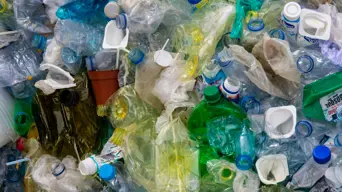Plastic pollution has spread to our brains: ‘It's become a part of us' - GroundUp journalist
The issue is having an enormous impact on the environment and human health.

Picture: Magda Ehlers via pexels
702’s Bongani Bingwa speaks with GroundUp fellowship journalist Carol Albertyn Christie.
Listen below:
Plastic pollution is a growing crisis impacting our planet.
Research shows microplastics, tiny particles under 5mm, have contaminated oceans, soil, air, and food sources.
Christie adds that nanoplastics, which are 1000 times smaller that 1mm, have been found in human organs such as the heart, liver, lungs and placentas.
These tiny plastics are so prevalent in our society that babies have been born with plastic already inside them.
“Plastic has actually become a part of us. I do not think there is a human being on Earth who does not have plastic inside of them.”
- Carol Albertyn Christie, GroundUp Fellowship Journalist
One study found seven grams of plastic on average inside the human brain.
The plastic may be entering our bodies through the air we breathe, the water we drink, or the products we put on our skin.
RELATED: Should we be worried about microplastics and nanoplastics found in the human body?
“I think this is a far bigger threat than we ever anticipated.”
- Carol Albertyn Christie, GroundUp Fellowship Journalist
Christie has worked on a series on microplastics on GroundUp which can be watched here.
Scroll up to the audio player for more.